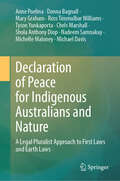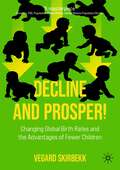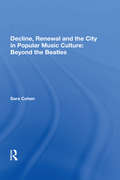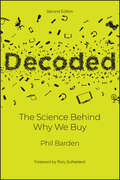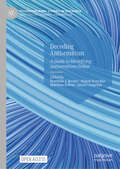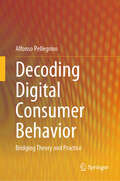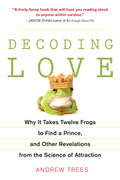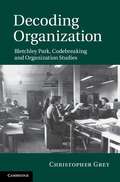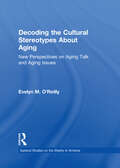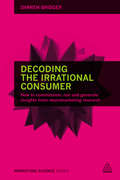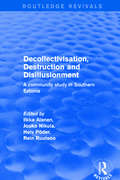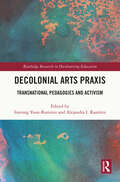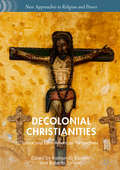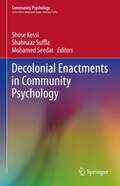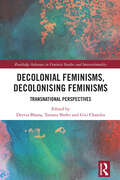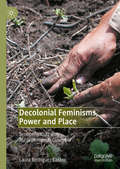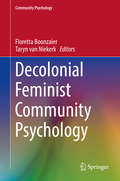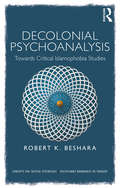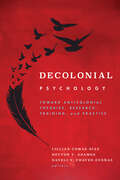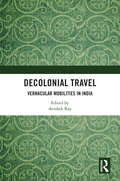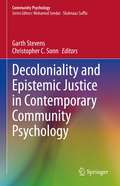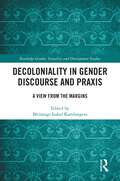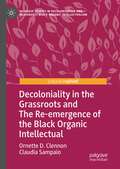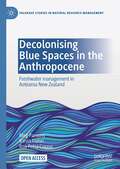- Table View
- List View
Declaration of Peace for Indigenous Australians and Nature: A Legal Pluralist Approach to First Laws and Earth Laws
by Michael Davis Mary Graham Michelle Maloney Tyson Yunkaporta Anne Poelina Donna Bagnall Ross Timmulbar Williams Chels Marshall Shola Anthony Diop Nadeem SamnakayThis groundbreaking book delves into the lived experiences and collective wisdom of Indigenous communities impacted by colonialism. Through collaborations with non-Indigenous colleagues, this book seeks to inform current legal practices and advocate for a transformative shift toward justice, equity, and the recognition of First Law and Earth-centered law.By presenting Indigenous stories as case studies and incorporating the collective wisdom gained through extensive discussions and exchanges with non-Indigenous colleagues, the authors highlight the ways in which Australian law falls short in upholding holistic principles and fails to align with First Law and Earth-centered law. The book invites readers to consider alternative legal futures that are rooted in respect, justice, and the well-being of both Indigenous peoples and the natural environment. Through its thought-provoking analysis, literature reviews, and insights from Indigenous leaders, this book servesas a powerful resource for legal practitioners, policymakers, scholars, and anyone passionate about social justice and environmental sustainability. The book aims to ignite meaningful dialogue and inspire concrete actions to address the historical injustices faced by Indigenous peoples while fostering a more inclusive and equitable legal framework for the generations to come.
Decline and Prosper!: Changing Global Birth Rates and the Advantages of Fewer Children
by Vegard SkirbekkGlobally, women are having half as many children as they had just fifty years ago. Why have birth rates fallen, and how will low fertility affect our shared future? In Decline and Prosper!, demographic expert Vegard Skirbekk offers readers an accessible, comprehensive and evidence-based overview of human reproduction. Readers learn about the evolution of childbearing across different populations and how fertility is related to (changes in) our reproductive capacity, contraception, education, religion, partnering, policies, economics, assisted reproduction, and catastrophes. Readers will explore the future of family size and its impact on human welfare, women’s empowerment and the environment. Skirbekk argues that low fertility is on the whole a good thing, while recognizing the challenges of population aging and “coincidental” childlessness. A balanced, integrative examination of one of the most important issues of our time, Decline and Prosper! drives home the fact that we must ultimately adapt to a world with fewer children. The book will be invaluable to anyone who is interested in the far-reaching effects of global fertility, including researchers and students of demography, social statistics, medical sociologists, family and childhood studies, human geographers, sociology of culture, social and public policy.
Decline, Renewal and the City in Popular Music Culture: Beyond the Beatles (Ashgate Popular And Folk Music Ser.)
by Sara CohenHow is popular music culture connected with the life, image, and identity of a city? How, for example, did the Beatles emerge in Liverpool, how did they come to be categorized as part of Liverpool culture and identity and used to develop and promote the city, and how have connections between the Beatles and Liverpool been forged and contested? This book explores the relationship between popular music and the city using Liverpool as a case study. Firstly, it examines the impact of social and economic change within that city on its popular music culture, focusing on de-industrialization and economic restructuring during the 1980s and 1990s. Secondly, and in turn, it considers the specificity of popular music culture and the many diverse ways in which it influences city life and informs the way that the city is thought about, valued and experienced. Cohen highlights popular music's unique role and significance in the making of cities, and illustrates how de-industrialization encouraged efforts to connect popular music to the city, to categorize, claim and promote it as local culture, and harness and mobilize it as a local resource. In doing so, she adopts an approach that recognizes music as a social and symbolic practice encompassing a diversity of roles and characteristics: music as a culture or way of life distinguished by social and ideological conventions; music as sound; speech and discourse about music; and music as a commodity and industry.
Decoded: The Science Behind Why We Buy
by Phil BardenA groundbreaking exploration of purchasing behaviour and its essential role in smarter marketing practices to benefit your organizationIf you understand why people buy, you are already one step ahead in reaching out to them effectively with your products and services. Decoded: The Science Behind Why We Buy offers a groundbreaking exploration into the science of purchasing. The book specifically demonstrates why decision science has proven invaluable to the field of marketing by helping to explain purchasing behaviours.Decoded delivers a practical framework and guidelines for applying science to the marketing practices you use every day. As a marketing professional, you can look to this book for behavioural knowledge, timely case studies, and an understanding of methodologies. You'll gain advice on how to employ knowledge about behaviours for more effective brand management, from strategy to implementation to new product development.You'll also gain useful insight into the latest research on consumer motivations that lead to purchasing decisions. Learn more about what happens in the human brain as buyers make their choices. This updated edition of Decoded provides new material that marketers can apply to informed, successful practices. Gain an understanding of the Jobs to Be Done (JTBD) approach Take a closer look at the Ferrero neuroscience study that supports JTBD See updated and relevant case studies of JTBD at work Discover how to engage customers through digital touchpoints If you're a marketing practitioner, an understanding of decision science will enhance your day-to-day work. Decoded helps you see how science and marketing come together. Immerse yourself in the science of why people buy and gain a stronger base of knowledge as you develop strategies, implement marketing plans, and meet customer needs through innovation.
Decoding Antisemitism: A Guide to Identifying Antisemitism Online (Postdisciplinary Studies in Discourse)
by Matthew Bolton Matthias J. Becker Hagen Troschke Alexis ChapelanThis open access book is the first comprehensive guide to identifying antisemitism online today, in both its explicit and implicit (or coded) forms. Developed through years of on-the-ground analysis of over 100,000 authentic comments posted by social media users in the UK, France, Germany and beyond, the book introduces and explains the central historical, conceptual and linguistic-semiotic elements of 46 antisemitic concepts, stereotypes and speech acts. The guide was assembled by researchers working on the Decoding Antisemitism project at the Centre for Research on Antisemitism at Technische Universität Berlin, building on existing basic definitions of antisemitism, and drawing on expertise in various fields. Using authentic examples taken from social media over the past four years, it sets out a pioneering step-by-step approach to identifying and categorising antisemitic content, providing guidance on how to recognise a statement as antisemitic or not. This book will be an invaluable tool through which researchers, students, practitioners and social media moderators can learn to recognise contemporary antisemitism online – and the structural aspects of hate speech more generally – in all its breadth and diversity.
Decoding Digital Consumer Behavior: Bridging Theory and Practice
by Alfonso PellegrinoThis book is a call to adopt more ethical, sustainable, and consumer-focused approaches in the digital era. The focus on consumer perceptions and expectations in a digital context is particularly relevant, as it delves into the psychological and behavioral aspects of digital interactions. The chapters on digital consumption and risk, and memory in the digital world, are pivotal in understanding how digital mediums impact consumer choices and brand recall. Online persuasion, a key topic, explores ethical and effective strategies for influencing consumer behavior, emphasizing the importance of authenticity and trust. The discussion on social comparison and its implications in digital consumption underscores the psychological impact of digital platforms. The chapters on humanistic and sustainable marketing, and digital customer experience, reflect the growing importance of ethical, sustainable practices, and customer-centric approaches in building brand loyalty. The book is an essential guide for marketing professionals and students, offering a comprehensive understanding of the complex interplay between digital marketing strategies and consumer behavior.
Decoding Love
by Andrew TreesRead Andrew Trees's posts on the Penguin Blog. A smart, entertaining, and eye-opening look at the science of love, publishing for Valentine's Day Relationships should be so simple. You meet someone. You fall in love. You live happily every after. This "romantic story line" has shaped our thinking about relationships for centuries. But the fairy tale is deeply flawed, and researchers today are making shocking discoveries about how and why we choose the people we love. Drawing from the latest studies in economics, brain science, game theory, evolutionary psychology, and other fields, Decoding Love takes on a topic we all think we understand-how we fall in love-and illustrates that most of our assumptions are wrong. Along the way, Andrew Trees offers surprising new insights into the nature of attraction and desire, as well as an intimate look at the strange intersection of romance and the modern world of dating.
Decoding Modern Consumer Societies
by Hartmut Berghoff Uwe SpiekermannDrawing on a wide range of studies of Europe, the United States, Asia, and Africa, the contributions gathered here consider how political history, business history, the history of science, cultural history, gender history, intellectual history, anthropology, and even environmental history can help us decode modern consumer societies.
Decoding Organization
by Christopher GreyHow was Bletchley Park made as an organization? How was signals intelligence constructed as a field? What was Bletchley Park's culture and how was its work co-ordinated? Bletchley Park was not just the home of geniuses such as Alan Turing, it was also the workplace of thousands of other people, mostly women, and their organization was a key component in the cracking of Enigma. Challenging many popular perceptions, this book examines the hitherto unexamined complexities of how 10,000 people were brought together in complete secrecy during World War II to work on ciphers. Unlike most organizational studies, this book decodes, rather than encodes, the processes of organization and examines the structures, cultures and the work itself of Bletchley Park using archive and oral history sources. Organization theorists, intelligence historians and general readers alike will find in this book a challenge to their preconceptions of both Bletchley Park and organizational analysis.
Decoding the Cultural Stereotypes About Aging: New Perspectives on Aging Talk and Aging Issues (Garland Studies on the Elderly in America)
by Evelyn M. O'ReillyThis collection will present works that offer illuminating perspectives on the remarkably diverse Asian American populations of the United States. As a population that is neither black nor white, the range of experiences of these groups, many of whom arrived as refugees, presents other perspectives on the cultural mosaic that constitutes the United States. Studies of Asian Americans sheds light on issues related to immigration, refugee policy, transnationalism, return migration, cultural citizenship, ethnic communities, community building, identity and group formation, panethnicity, race relations, gender and class, entrepreneurship, employment, representation, politics, adaptation, and acculturation. The writings in this collection are drawn from a wide variety of disciplines to provide a broad and informative array of insights on these fascinating and diverse populations.
Decoding the Irrational Consumer
by Darren BridgerDecoding the Irrational Consumer was written to help marketing practitioners demystify neuromarketing, a relatively new field of marketing research used to understand consumer response to marketing stimuli. This book presents in plain terms the key theoretical tools required to implement neuromarketing studies and achieve desired research outcomes. Marketers and researchers will learn how to effectively and confidently brief data processors, and confer with neuroscientists and technicians. They will gain keen understanding of recent developments in behavioural science and data-processing technology, as well as sophisticated neuromarketing tools used to understand subconscious responses including behavioural economics, eye-tracking, implicit response measures, and facial coding. The author discusses when to apply these techniques and others, how to combine them effectively and how to correctly interpret resulting data to generate valuable insights that aid in decision making. About the series: The Marketing Science series makes difficult topics accessible to marketing students and practitioners by grounding them in business reality. Each book is written by an expert in the field and includes case studies and illustrations enabling marketers to gain confidence in applying the tools and techniques and in commissioning external research.
Decollectivisation, Destruction and Disillusionment: A Community Study in Southern Estonia (Routledge Revivals Ser.)
by Ilkka Alanen Jouko Nikula Rein RuutsooThis title was first published in 2001. A depiction of the decollectivization process of agriculture and the rebirth of capitalistic relations in Southern Estonia - with all their consequences at various levels of social structure and social relations.
Decolonial Arts Praxis: Transnational Pedagogies and Activism (Routledge Research in Decolonizing Education)
by Injeong Yoon-Ramirez Alejandra I. RamírezDecolonial Arts Praxis: Transnational Pedagogies and Activism illustrates the productive potential of critical arts pedagogies in the ongoing work of decolonization by engaging art, activism, and transnational feminisms. Offering contributions from scholars, educators, artists, and activists from varied disciplines, the volume highlights how arts can reveal intersectional forms of oppression, inform critical understandings, and rebuild transnational solidarities across geopolitical borders. The contributors present forms of enquiry, creative writing, art, and reflection which grapple with issues of colonialism, racism, and epistemological violence to illustrate the power of decolonial arts pedagogies in formal and informal education. Using a range of multiple and intersectional critical lenses, through which readers can examine ways in which transnational feminist theorizing and art pedagogy inform, shape, and help strategize activism in various spaces, it will appeal to scholars, postgraduate students, and practitioners with interests in arts education, the sociology of education, postcolonialism, and multicultural education.
Decolonial Christianities: Latinx and Latin American Perspectives (New Approaches to Religion and Power)
by Raimundo Barreto Roberto SirventWhat does it mean to theorize Christianity in light of the decolonial turn? This volume invites distinguished Latinx and Latin American scholars to a conversation that engages the rich theoretical contributions of the decolonial turn, while relocating Indigenous, Afro-Latin American, Latinx, and other often marginalized practices and hermeneutical perspectives to the center-stage of religious discourse in the Americas. Keeping in mind that all religions—Christianity included—are cultured, and avoiding the abstract references to Christianity common to the modern Eurocentric hegemonic project, the contributors favor embodied religious practices that emerge in concrete contexts and communities. Featuring essays from scholars such as Sylvia Marcos, Enrique Dussel, and Luis Rivera-Pagán, this volume represents a major step to bring Christian theology into the conversation with decolonial theory.
Decolonial Enactments in Community Psychology (Community Psychology)
by Mohamed Seedat Shahnaaz Suffla Shose KessiThis edited volume in the Community Psychology Book Series emphasizes applications of community psychology for disrupting dominant and hegemonic power relations. The book explores domains of work that are located within critical community psychology, as well as work that is conventionally not self-defined as community psychology but which draws on and contributes to the foundations and enactments of critical and liberatory community psychology. Specifically, the book advances conceptions and praxes for community psychology grounded within a decolonial framework. The volume heeds the call for a generation of approaches to community psychology that link local struggles to broader questions of power, identity, and knowledge production, bringing together examples of praxes from different contexts as a political project of highlighting indigenous struggles toward self-determination. Collectively, the chapters in this book embody a decolonial agenda for community psychology that foregrounds social justice; the lives and knowledges of the marginalized and oppressed; epistemic disobedience and transdisciplinarity; and decolonial aesthetics. The book is divided into two parts - Part I: Conceptions of Engagement for Community Psychology delves into the conceptual framework for a decolonial community psychology, and Part II: Modes of Enactments and Praxes for Community Psychology builds on these theoretical advancements through examples of praxis in different contexts. The audience for the book includes scholars, researchers, practitioners, activists, and students located within community psychology specifically, as well as disciplines within the health and social sciences, and arts and humanities more broadly.
Decolonial Feminisms, Decolonising Feminisms: Transnational Perspectives (Routledge Advances in Feminist Studies and Intersectionality)
by Deevia Bhana Giti Chandra Tamara SheferThis book redefines feminist discourse by exploring the intersections of decolonial feminisms across various geopolitical contexts, emphasising the integration of local and indigenous narratives that challenge colonial epistemologies.The volume is organised into three thematic parts that critique traditional feminist frameworks, highlight innovative pedagogical methodologies, and showcase activism aimed at addressing intersectional inequalities. Each section features contributions from established scholars and emerging voices from both the Global North and the Global South, fostering interdisciplinary discussions that reflect a rich diversity of experiences. This approach not only enhances understanding of feminist thought but also promotes transformative practices that advocate for gender and social justice.The book is targeted at scholars, students, and activists in feminist studies, postcolonial theory, and social justice and is a must-read for those looking to expand their understanding of feminist thought. Its emphasis on collaboration and solidarity makes it a valuable resource for anyone interested in addressing the complex global issues influenced by colonial histories while envisioning a more equitable future.
Decolonial Feminisms, Power and Place: Sentipensando with Rural Women in Colombia
by Laura Rodríguez CastroThis book draws on participatory ethnographic research to understand how rural Colombian women work to dismantle the coloniality of power. It critically examines the ways in which colonial feminisms have homogenized the "category of woman,” ignoring the intersecting relationship of class, race, and gender, thereby excluding the voices of “subaltern women” and upholding existing power structures. Supplementing that analysis are testimonials from rural Colombian women who speak about their struggles for sovereignty and against territorial, sexual, and racialized violence enacted upon their land and their bodies. By documenting the stories of rural women and centering their voices, this book seeks to dismantle the coloniality of power and gender, and narrate and imagine decolonial feminist worlds. Scholars in gender studies, rural studies, and post-colonial studies will find this work of interest.
Decolonial Feminist Community Psychology: Critical Perspectives From The Global South (Community Psychology)
by Floretta Boonzaier Taryn Van NiekerkThis edited volume seeks to critically engage with the diversity of feminist and post-colonial theory to counter hegemonic Western knowledge in mainstream community psychology. In doing so, it situates paradigms of thought and representation that capture the lived experiences of those in the global South. Specifically, the book takes an intersectional approach towards its reshaping of community psychology, centering African, black, postcolonial, and decolonial feminist critiques in its 1) critique of existing hegemonic Euro-American community psychology concepts, theories, and practice, 2) proposal of new feminist, indigenous, and decolonial methodological approaches, and 3) real-life examples of engagement, research, dialogue, and reflexive qualitative psychology practice. The book concludes with an agenda for theorization and research for future practice in postcolonial contexts. The volume is relevant to researchers, practitioners, and students in psychology, anthropology, sociology, public health, development studies, social work, urban studies, and women’s and gender studies across global contexts.
Decolonial Psychoanalysis: Towards Critical Islamophobia Studies (Concepts for Critical Psychology)
by Robert BesharaIn this provocative and necessary book, Robert K. Beshara uses psychoanalytic discursive analysis to explore the possibility of a genuinely anti-colonial critical psychology. Drawing on postcolonial and decolonial approaches to Islamophobia, this book enhances understandings of Critical Border Thinking and Lacanian Discourse Analysis, alongside other theoretico-methodological approaches. Using a critical decolonial psychology approach to conceptualize everyday Islamophobia, the author examines theoretical resources situated within the discursive turn, such as decoloniality/transmodernity, and carries out an archeology of (counter)terrorism, a genealogy of the conceptual Muslim, and a Žižekian ideology critique. Conceiving of Decolonial Psychoanalysis as one theoretical resource for Critical Islamophobia Studies (CIS), the author also applies Lacanian Discourse Analysis to extracts from interviews conducted with US Muslims to theorize their ethico-political subjectivity and considers a politics of resistance, adversarial aesthetics, and ethics of liberation. Essential to any attempt to come to terms with the legacy of racism in psychology, and the only critical psychological study on Islamophobia in the United States, this is a fascinating read for anyone interested in a critical approach to Islamophobia.
Decolonial Psychology: Toward Anticolonial Theories, Research, Training, and Practice (Cultural, Racial, and Ethnic Psychology Series)
by Hector Y. Adames Lillian Comas-Díaz Nayeli Y. Chavez-DueñasThis book offers an expert synthesis of the scholarly literature on approaches to decolonial psychology, its historical foundations, education and training, and psychological practice. From its inception, psychological science and practice in the United States has been framed predominantly by Eurocentric epistemologies. As a result, oppressed people have internalized the belief that their culture and values are inferior to those of dominant groups. Infusing a decolonial lens into psychology is one way for the field to become more inclusive and relevant to the numerical majority worldwide. Decolonial psychology creates space and methods for oppressed and impoverished communities to radically imagine their existence outside of the superimposed borders of coloniality, neoliberalism, racism, and other systems of oppression. It emphasizes how people's subjectivity and connections to diverse social groups are influenced by history, context, and oppression; how these populations actively resist and survive attacks on their humanity; and how knowledge production is shaped not only by how data is interpreted but also by the questions asked. The chapters in this book provide an opportunity for readers to deepen their understanding of how colonization and coloniality impacted knowledge creation in society and the field of psychology, including thought-provoking resources that explore the subject matter. The book also underscores how coloniality continues to reverberate in many aspects of psychology today. Collectively, the authors invite readers to resist engaging in psycolonization by generating ideas and pathways to help reclaim, honor, and celebrate Indigenous ways of knowing and being. The volume offers guidance on methods to disrupt psycolonization and its epistemic violence, helping to provide a roadmap to decolonial psychology and anticolonial futures. It is time to confront the limitations of mainstream psychology. This book will help psychologists at all levels anchor their research, teaching, and practice in decolonial methods and practices.
Decolonial Travel: Vernacular Mobilities in India
by Avishek RayThis volume brings together scholarship on indigenous forms of travel to decolonize travel theory. It looks at certain minoritarian-vernacular traveling cults – very rarely examined – that compel us to rethink, on the one hand, the conventional tropes of and rationales for travel; and, on the other hand, notions of (post)coloniality, nationalism and modernity in the context of India. The book illustrates the enduring problematic of the ‘colonial episteme’: how it deploys pervasive categories through which travel practices are sought to be understood, and why such categories are inadequate in accounting for the vernacular traveling cults in question. In studying the vernacular world-making in and through these cults, this book offers critical insights on how they defy the log(ist)ics of the ‘imperial categories’ and why they must be read as expressions of decoloniality. An important contribution to travel studies, the book will be an indispensable resource for students and researchers of South Asian studies, travel theory, Indian literary and cultural studies, cultural history and anthropology, sociology, and decoloniality.
Decoloniality and Epistemic Justice in Contemporary Community Psychology (Community Psychology)
by Christopher C. Sonn Garth StevensThis book examines the ways in which decolonial theory has gained traction and influenced knowledge production, praxis and epistemic justice in various contemporary iterations of community psychology across the globe. With a notable Southern focus (although not exclusively so), the volume critically interrogates the biases in Western modernist thought in relation to community psychology, and to illuminate and consolidate current epistemic alternatives that contribute to the possibilities of emancipatory futures within community psychology. To this end, the volume includes contributions from community psychology theory and praxis across the globe that speak to standpoint approaches (e.g. critical race studies, queer theory, indigenous epistemologies) in which the experiences of the majority of the global population are more accurately reflected, address key social issues such as the on-going racialization of the globe, gender, class, poverty, xenophobia, sexuality, violence, diasporas, migrancy, environmental degradation, and transnationalism/globalisation, and embrace forms of knowledge production that involve the co-construction of new knowledges across the traditional binary of knowledge producers and consumers. This book is an engaging resource for scholars, researchers, practitioners, activists and advanced postgraduate students who are currently working within community psychology and cognate sub-disciplines within psychology more broadly. A secondary readership is those working in development studies, political science, community development and broader cognate disciplines within the social sciences, arts, and humanities.
Decoloniality in Gender Discourse and Praxis: A View from the Margins (Routledge ISS Gender, Sexuality and Development Studies)
by Mtisunge Isabel KamlongeraThis book showcases Global South theorizations and understandings of gender.By taking voices from the margins and putting them center stage, this book provides an important example of decoloniality in action, challenging a field that continues to be rooted in Western Feminist epistemology. This book first analyzes the history and development of gender discourse, before going on to investigate non-Western philosophy and frameworks around gender. Each chapter presents instances of decoloniality in action, with possible retheorizations and rationalizations of how to be decolonial within gender discourse and praxis. This book concludes by considering what the future implications of a truly decolonial gender discourse and praxis would be.Offering detailed empirical accounts of decoloniality in action, this book will be a useful guide for researchers of gender and post-colonial studies.
Decoloniality in the Grassroots and The Re-emergence of the Black Organic Intellectual (Palgrave Studies in Decolonisation and Grassroots Black Organic Intellectualism)
by Ornette D. Clennon Claudia SampaioThis book explores the relationship between "the roles of the Black “organic intellectual” and the PoC academic scholar, and outlines how important partnerships are emerging from these sometimes-contrasting decolonial praxes. By blending the decolonial processes of Indigenous rights via a liberation Psychology lens, Brazilian critical race scholarship and UK African diasporic collective consciousness via intersectional critical race studies, the authors provide a clear theoretical framework to show how a decolonised multi-layered community epistemology can be produced by the community for the community that in praxis form, can be employed for the fight for social justice within those communities.
Decolonising Blue Spaces in the Anthropocene: Freshwater management in Aotearoa New Zealand (Palgrave Studies in Natural Resource Management)
by Karen Fisher Meg Parsons Roa Petra CreaseThis open access book crosses disciplinary boundaries to connect theories of environmental justice with Indigenous people’s experiences of freshwater management and governance. It traces the history of one freshwater crisis – the degradation of Aotearoa New Zealand’s Waipā River– to the settler-colonial acts of ecological dispossession resulting in intergenerational injustices for Indigenous Māori iwi (tribes). The authors draw on a rich empirical base to document the negative consequences of imposing Western knowledge, worldviews, laws, governance and management approaches onto Māori and their ancestral landscapes and waterscapes. Importantly, this book demonstrates how degraded freshwater systems can and are being addressed by Māori seeking to reassert their knowledge, authority, and practices of kaitiakitanga (environmental guardianship). Co-governance and co-management agreements between iwi and the New Zealand Government, over the Waipā River, highlight how Māori are envisioning and enacting more sustainable freshwater management and governance, thus seeking to achieve Indigenous environmental justice (IEJ). The book provides an accessible way for readers coming from a diversity of different backgrounds, be they academics, students, practitioners or decision-makers, to develop an understanding of IEJ and its applicability to freshwater management and governance in the context of changing socio-economic, political, and environmental conditions that characterise the Anthropocene.
